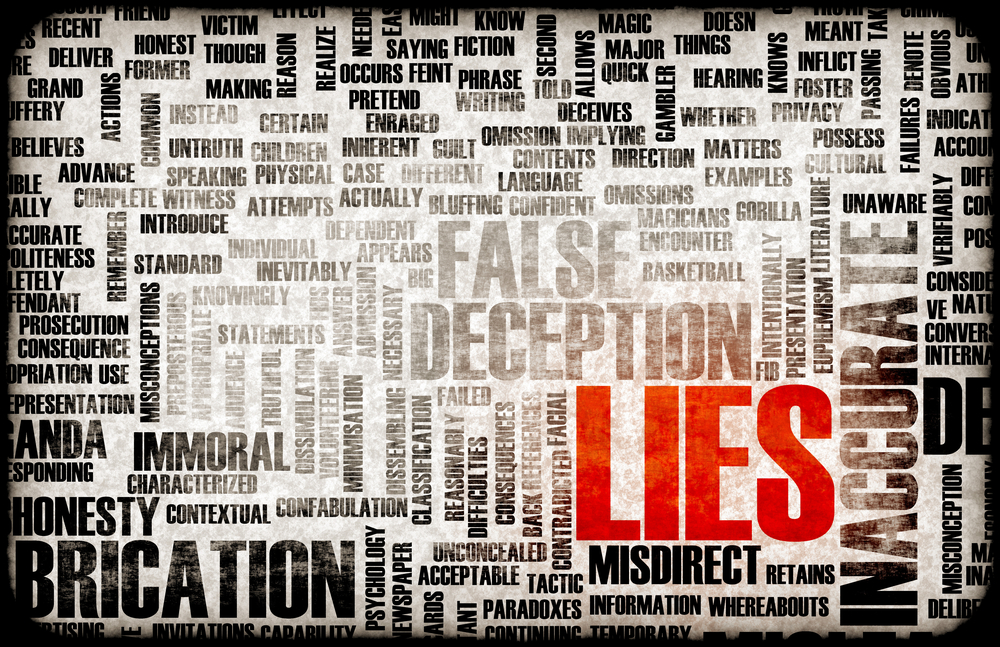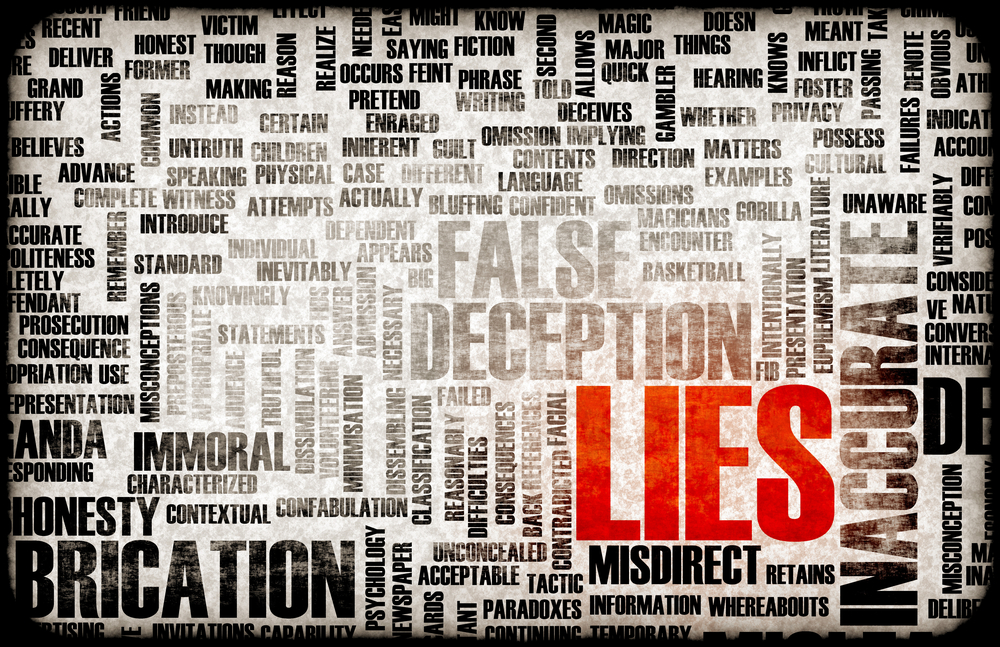Famed British novelist George Orwell once observed, “In a time of universal deceit, telling the truth is a revolutionary act.” Although he stated this over 70 years ago, he was describing our day well.
The Thought Police in Orwell’s 1984 have reappeared as today’s social media “fact checkers.” If you dare to tell the truth or question groupthink, you’re likely to be banned from Twitter or placed in Facebook prison.
Meanwhile, we’re drowning in an ocean of fake news. Even worse, we can’t seem to agree on who’s responsible. Conservatives say liberals are the ones promoting biased news, while liberals blame our culture’s rampant misinformation on conservatives.
Of course, fake news isn’t a new thing. It has been around since the beginning of human history. Remember the cunning serpent in Genesis 3? Yet the rise of the internet and social media has taken deception to astronomical new levels.
Following the Money
Recent events have shown that one way to detect misinformation is to “follow the money.” This certainly was true concerning much of the advice we received during the Covid pandemic. Government officials and school boards claimed they were simply “following the science,” but that was seldom the case. Many of our so-called experts were found to have a financial or political stake in their decisions.
Fake news even erupted after Jesus’ resurrection, and money was involved once again. The religious leaders offered the soldiers at Jesus’ tomb a large bribe to spread misinformation:
They told the soldiers, “You must say Jesus’ disciples came during the night while we were sleeping, and they stole his body. If the governor hears about it, we’ll stand up for you so you won’t get in trouble.” So the guards accepted the bribe and said what they were told to say. Their story spread widely among the Jews, and they still tell it today (Matthew 28:11-15).
Doesn’t this sound like a rather modern story? Money shapes media messaging, and news anchors merely report what they’ve been told to say.
Jesus said the truth would set us free (John 8:32), but truth is difficult to find in a greedy and relativistic society. The prophet Isaiah painted a horrifying picture of such times:
Our courts oppose the righteous, and justice is nowhere to be found. Truth stumbles in the streets, and honesty has been outlawed (Isaiah 59:14).
Who would have thought that honesty could be outlawed in America? But big tech social media companies have largely succeeded in making that happen.
No wonder Jesus warned His followers to avoid the widespread deception that would characterize the Last Days (Matthew 24:4). We’ve been forewarned!
Honest Journalists
Are there still any honest journalists in today’s world? Not many. Rather than taking time to track down the truth of a matter, they often just parrot each other and recite a script concocted by corporate sponsors.
In contrast, Luke said his Gospel account of Jesus’ life was based on “eyewitness reports” and careful investigation. He declared that his text was “an accurate account…so you can be certain of the truth of everything you were taught” (Luke 1:1-4).
What a high standard! Wouldn’t it be great if today’s journalists took the same careful approach?
No matter which networks or talk show hosts we listen to, there will always be some degree of misinformation in the news we hear. Some of the fake news is no doubt the result of sincere mistakes rather than intentional deception, but it’s dangerous just the same.
One of the earmarks of the End Times is that “knowledge will increase” (Daniel 12:4). That’s a great thing in many ways, but it’s also problematic. How can we sift through the flood of information to detect what’s real and what’s not? And is there any way to hold news outlets accountable if they repeatedly spread debunked stories?
An interesting characteristic of many modern journalists is their delight in ridiculing “conspiracy theories.” The only problem is that many of these discredited theories end up being proven true!
Okay, I realize that conspiracy theories often can be dangerous. But have you noticed how enticing they are? Their amazing allure can only be explained by somehow triggering dopamine in our brain!
Here’s my guess: When we come across a story of political intrigue, we feel like we’re being given privileged access to information few other people have received. Conspiracy theories can be quite an ego trip, similar to what the Gnostics experienced long ago with their “secret knowledge.”
Discerning Listeners
In a world of lies, how can we ever hope to become truth detectors? A brief passage in the book of Acts provides some helpful advice:
The people of Berea were more open-minded than those in Thessalonica, and they listened eagerly to Paul’s message. They searched the Scriptures day after day to see if Paul and Silas were teaching the truth. As a result, many Jews believed, as did many of the prominent Greek women and men (Acts 17:11-12).
Don’t miss these great lessons that can be gleaned from how the Bereans reacted to the apostle Paul’s preaching:
- We must be open-minded and eager to discover the truth. In contrast to the Bereans, many people today have already made up their minds about what they will believe!
- We must have a trustworthy grid for evaluating what we hear. Although the Bereans were teachable, they weren’t about to believe any misinformation. They could see that Paul and Silas were respected leaders, yet they still took time to search the Scriptures to see if the teachings were true. What a timely model for us! Too many Christians naively accept unbiblical teachings from their pastors or podcasters, never examining God’s Word for themselves.
- We must beware of creating a celebrity culture in the church. The Bereans recognized that even a scholar like Paul could be wrong! In the same way, we must stop creating “untouchable” rock star pastors or prophetic teachers. There’s an urgent need for more discernment! In a world of misinformation, we need to hear the voice of God’s Spirit and be anchored in the unchanging truth of His Word.
Notice that the Bereans didn’t respond positively because of human eloquence, but because they saw Paul’s gospel message confirmed in the Old Testament. Jesus had promised that the Holy Spirit would lead His followers into all truth (John 16:13), but the Bereans showed that the process of discernment should begin with a commitment to searching the Scriptures.
The Wrong Spirit
I’m grieved that my fellow Christians sometimes unwittingly spread fake news. Even more distressing, I’ve been guilty of this myself.
But when I look back at my behavior and words during the controversies of the past few years, there’s something far worse that I’ve been guilty of: Even when I’ve gotten my “facts” right, I’ve sometimes acted in the wrong spirit.
I’m increasingly aware that some of my favorite talk show hosts and political pundits have fueled this tendency in me. What they’re saying may be true, but they’re promoting their message in a spirit that is not Christlike.
Two of Jesus’ disciples, James and John, displayed this same problem (Luke 9:51-56). When people in a Samaritan village refused to welcome Jesus, these zealous disciples proposed that fire be called down from heaven to incinerate everyone! They thought their proposal was quite spiritual – modeled after the prophet Elijah – but Jesus rebuked them. In the KJV, Jesus told James and John that they didn’t realize “what manner of spirit” was controlling them.
Dear friend, there’s power in speaking the truth to people, because the truth can set them free (John 8:32). But unless we speak the truth in love, our words are likely to do more damage than good (Ephesians 4:15). As one old preacher reminded his flock, “You can be right and still be wrong.”
The Problem with Consensus
I used to think a wonderful objective was to seek consensus on every issue. Isn’t unity a good thing?
But now I’m incredibly skeptical when people claim to have a consensus for their position. Have we forgotten all the Bible stories displaying the danger occurring when everyone seems to agree?
A few examples…
- The Israelites had a consensus that they should return to Egypt rather than pressing forward into the Promised Land.
- On Palm Sunday the people in Jerusalem had a consensus that Jesus was the Messiah coming to liberate them – but a few days later they all greed He should be crucified.
You see, not every consensus is a reliable indicator of truth. Often the consensus is merely groupthink, and the minority position proves right in the end. Mark Twain said this well: “Whenever you find yourself on the side of the majority, it is time to pause and reflect.”
Let this sink in, for Twain’s warning should be troubling for us today. Which of the consensus beliefs in our generation are actually true? There’s a long list of items we should take time to reevaluate: Masks? Vaccines? Lockdowns? Climate change? The veracity of government agencies such as the FBI, CIA, CDC, Pentagon, Congress, and White House? Big Pharma? The Military Industrial Complex? The New York Times and Washington Post?
I’m just getting started, and I’m sure you could add to this list.
If there’s any lesson we should have learned from Covid, it’s that the so-called experts are often wrong. Even if the conspiracy theorists are wrong about the nefarious motives of our government officials and medical experts, our leaders have clearly fallen short in their guidance.
So…beware of groupthink. Refuse to be hoodwinked by a herd mentality. Be wary of getting all your news from one media outlet.
Dear friends, let’s take pains to be like the Bereans, prayerfully questioning everything. In a world filled with lies, there has never been a more important time to be a truth detector.




Thanks Jim
Well spoken. God’s word is where we find both truth and true wisdom.
A very well thought-through article. Thanks!
It is such a powerful reminder.
How often we think wisdom only applies to everyone else.
I very much enjoy and treasure a good “think tank” or Mastermind, but it’s not about swaying another’s opinion but sharing information with those those also seek the truth, the Bereans, and then do the research.
As much as I am a huge researcher, I can also just as easily fall prey, if I for one instance believe something without staying in prayer and the Spirit of God.
And just like that, my flesh is jumping to conclusions.
Thank you for the reminder! Amen